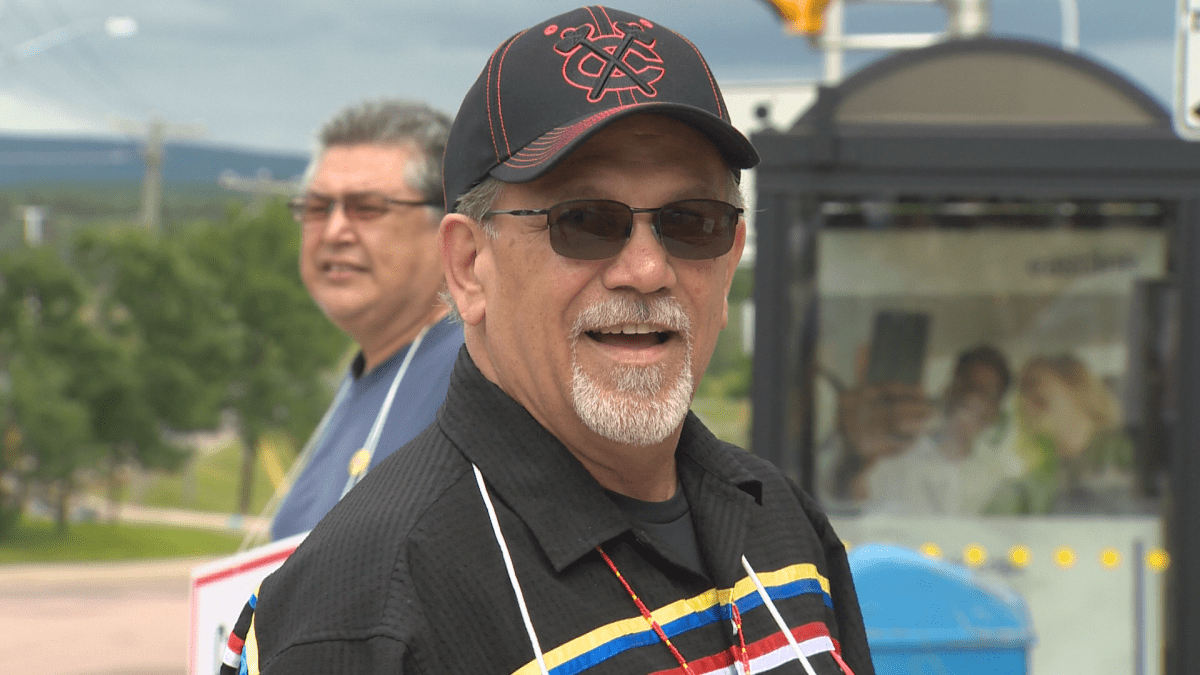Members of the Natoaganeg (Eel Ground) First Nation involved in a protracted dispute with the federal government over access to the snow crab fishery took their frustrations to the Department of Fisheries and Oceans office in Moncton on Monday.

“It’s time for fairness, it’s time for equity,” said Chief George Ginnish over a loudspeaker. “It’s time to honour the treaties.”
Members of first nation, located near Miramichi, said they’ve been stuck in a case of “historical exclusion,” after years of not being able to reach a settlement for access to snow crab.
READ MORE: N.B. First Nation says they’ll resume fishery amid negotiations with DFO
“We’re not accepting it anymore, there’s been 20 years to implement (the Supreme Court of Canada’s ‘Marshall’ decision), and now there’s a new rights recognition agreement called the ‘Jones agreement,’ is what it’s being called,” he said. “And we’re being asked to forego our rights for another 10 years.”
Fishers set traps again after an impasse in negotiations in late June, but the chief says they stopped after the season concluded.
76 traps have been seized by the department, at a value of $30-thousand this season, according to one of the fishers.
“They just followed us, marked our traps, and at the end of that, when we came in for fuel, we went back and all the traps were gone,” said Christian Tenass, a snow crab fisherman.
The first nation has six fishing licenses, but the two sides haven’t been able to reach a quota agreement.
“We think 300 tonne would have been fair, we would have accepted less if they had looked at our historical exclusion,” said Chief Ginnish.
“From the end of October, to the end of May, 80 per cent unemployment… it makes for really, it makes for tough decisions,” he said. “…When you look at the after-tax per household income of $25-thousand in my community, versus $52-thousand in others, that would probably be a really good starting point.”
Protesters held signs up against the door of the office, calling for action.
- Alberta to overhaul municipal rules to include sweeping new powers, municipal political parties
- Canada, U.S., U.K. lay additional sanctions on Iran over attack on Israel
- No more ‘bonjour-hi’? Montreal mayor calls for French only greetings
- Trudeau says ‘good luck’ to Saskatchewan premier in carbon price spat
READ MORE: N.B. First Nation demands DFO allow access to crab fishery
Barre G. Campbell, a senior media relations advisor for DFO, sent a statement late Monday saying the department “is aware of this protest,” and that it respects “the right of Canadians to peacefully protest as a means of voicing their opinions.”
“We remain open to continued dialogue, in order to arrive at a solution that will provide the Eel Ground representatives with access to snow crab,” the statement said. “We understand the importance of finding a path forward and are committed to finding a mutually agreeable solution.”
In response to a previous Global News story about snow crab access, the Department of Fisheries and Oceans has said they’ve been engaging in good faith with members of Natoaganeg to come to an agreement with respect to the snow crab fishery, but the chief says that’s not the case.
“They had promised to look at accommodating our historical exclusion,” he said. “The offer that was made by (the department) did not.”
Ginnish said they’re not going to be quiet about the issue anytime soon and will make their voices heard, especially with the federal election slated for the fall.
“You can’t expect to flourish when you have inadequate, unsafe housing, you don’t have opportunity to work, your education, your rights aren’t respected,” he said.

_848x480_1571132483825.jpg?w=1040&quality=70&strip=all)




Comments